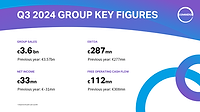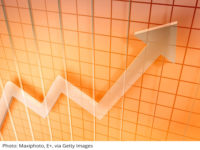BASF’s Core Businesses Drive Strong Q3 Performance

Image courtesy of BASF.
BASF Group’s EBITDA before special items in the third quarter of 2024 increased to €1.6 billion, up €77 million from the prior-year quarter, driven by significantly higher contributions from core businesses. “The positive earnings momentum in our core businesses was already visible in the first half of 2024 and continued in the third quarter, driven by higher volumes and margins,” said Dr. Markus Kamieth, chairman of the board of executive directors of BASF SE. The increase was partially offset by a considerable earnings decline in standalone businesses and Other.
BASF’s updated strategy, announced in late September 2024, differentiates its core businesses—Chemicals, Materials, Industrial Solutions and Nutrition & Care—from standalone businesses reported in the Surface Technologies and Agricultural Solutions segments.
Sales in Q3 remained steady at €15.7 billion. Volume growth in nearly all segments had a positive impact, notably in Agricultural Solutions. However, Surface Technologies recorded a volume decline in Catalysts due to weak automotive demand. Negative currency effects, particularly related to the Argentine peso and Brazilian real, and lower prices in nearly all segments, especially in metals, also impacted sales.
The EBITDA margin before special items rose to 10.3%, up from 9.8% in the prior-year quarter. In core businesses, the margin before special items improved by 3.6 percentage points to 13.4%. Total EBITDA reached €1.3 billion, slightly down from €1.4 billion in Q3 2023, affected by special charges totaling minus €345 million, primarily for provisions in Agricultural Solutions associated with glufosinate-ammonium production site closures.
Earnings before interest and taxes (EBIT) totaled €250 million, down €144 million from the prior-year quarter. Depreciation and amortization were €1 billion, compared with €969 million a year earlier.
Net income was €287 million, a substantial increase from a loss of €249 million in Q3 2023. This improvement was primarily due to €398 million in special income from the transfer of Wintershall Dea assets to Harbour Energy plc. In the prior-year period, special items of minus €291 million impacted Wintershall Dea.
Operating cash flows amounted to €2.1 billion, €633 million less than the prior-year quarter, driven largely by a greater reduction in trade accounts payable. Free cash flow was €569 million, down from €1.5 billion a year ago.
Cost Savings on Track
Chief Financial Officer Dr. Dirk Elvermann reported that BASF is on target to reach its €2.1 billion annual cost savings goal by 2026. As of September 2024, BASF achieved a cost reduction run rate of €800 million, with one-time costs around €500 million. The company expects to exceed €800 million in cost reduction by year-end.
An additional cost savings program to boost Ludwigshafen site competitiveness is also progressing, with specific unit contributions set through 2026.
Updated Reporting Changes
Following the European Union’s Corporate Sustainability Reporting Directive, BASF will introduce two publication dates starting in 2025. Initial 2024 results will be published online, unaudited, on February 28, 2025, with audited results available on March 21, 2025, in both online and clickable PDF formats.
BASF Group 2024 Outlook
BASF’s assumptions for the full-year 2024 remain unchanged:
- GDP growth: +2.3%
- Industrial production growth: +2.2%
- Chemical production growth: +2.7%
- Average euro/dollar exchange rate: $1.10 per euro
- Average annual oil price: $80 per barrel
The full-year forecast remains at an EBITDA before special items between €8.0 billion and €8.6 billion, free cash flow of €0.1 billion to €0.6 billion, and CO₂ emissions of 16.7-17.7 million metric tons. BASF anticipates results at the lower end of the EBITDA range due to potential price declines and slower volume growth but sees opportunities in higher demand and margins.
For the complete results, view the full report here.
Looking for a reprint of this article?
From high-res PDFs to custom plaques, order your copy today!





